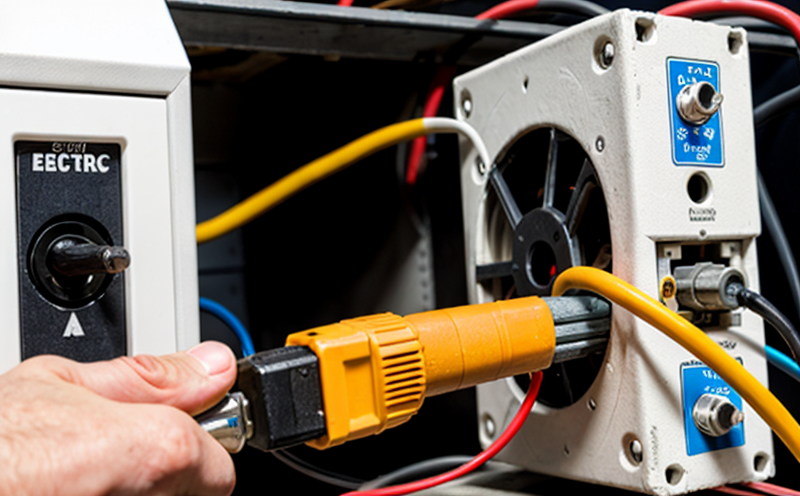IEC 60204-11 Electrical Safety for Machines with Functional Safety
The IEC 60204-11 standard is a critical framework that ensures the electrical safety of machines designed to operate in hazardous areas, particularly those involved in functional safety. This standard is essential in preventing accidents and ensuring compliance with international safety regulations.
The primary focus of this standard is on the electrical aspects of machinery used in potentially explosive atmospheres (classified as Zone 20-23). It addresses the risks associated with electrically operated machinery that may be exposed to these hazardous environments. The standard specifies requirements for the design, construction, installation, and operation of such machines.
IEC 60204-11 is particularly relevant for industries like petrochemicals, mining, and natural gas processing where safety is paramount due to the presence of flammable gases or dust. The standard ensures that electrical systems within these machines are safe from faults that could lead to ignition.
The scope of IEC 60204-11 covers the following aspects:
- Design considerations for electrical safety
- Installation and commissioning guidelines
- Operational requirements during use
- Testing and maintenance procedures
- Labeling and documentation standards
The standard also emphasizes the importance of functional safety, which ensures that a machine will perform its intended function correctly in all foreseeable operating conditions. This includes preventing malfunctions that could lead to hazardous situations.
To comply with IEC 60204-11, manufacturers must ensure their equipment is designed and tested according to these stringent requirements. Testing typically involves verifying the electrical components' ability to withstand specified environmental conditions without compromising safety. This can include high-voltage testing, insulation resistance measurement, and other relevant checks.
Testing is critical in identifying any potential weaknesses or non-compliance early in the development process, allowing for corrective actions before mass production begins. Proper testing not only enhances product reliability but also protects end-users by ensuring they are using safe machinery.
The IEC 60204-11 standard is part of a broader suite of standards that ensures electrical safety across various industries. By adhering to these guidelines, manufacturers can demonstrate their commitment to safety and compliance with international regulations.
Applied Standards
| Standard Name | Description |
|---|---|
| IEC 60204-11:2018 | Electrical safety of machines - Part 11: Machines for use in potentially explosive atmospheres |
| ISO/IEC 17025 | Absence of bias and traceability to international standards ensure reliability of test results. |
The application of these standards ensures that the tests conducted are not only accurate but also internationally recognized, providing a robust foundation for safety compliance.
Scope and Methodology
The scope of IEC 60204-11 includes the following:
- Designing electrical systems to prevent ignition sources in hazardous areas
- Implementing protective measures against overvoltage and undervoltage conditions
- Ensuring proper grounding and bonding of electrical components
- Testing for electromagnetic compatibility (EMC) compliance
The methodology involves several steps:
- Initial assessment of the machinery to identify potential hazards.
- Design review focusing on electrical safety features.
- Conducting tests using appropriate equipment and methodologies.
- Evaluating test results against specified criteria.
- Documenting findings and providing recommendations for improvements.
The testing process is rigorous, involving various types of electrical stress tests, insulation resistance measurements, and EMC checks. Each step is crucial in ensuring the machine meets the stringent requirements set forth by IEC 60204-11.
Testing labs must have the necessary expertise and equipment to perform these tests accurately. This includes state-of-the-art testing facilities and experienced personnel familiar with both international standards and local regulations.
Benefits
- Enhanced Safety: Reduces the risk of accidents caused by electrical failures in hazardous environments.
- Compliance Assurance: Ensures compliance with international standards, simplifying regulatory processes.
- Reputation Building: Demonstrates a commitment to safety and quality, enhancing brand reputation.
The benefits extend beyond mere compliance; they contribute significantly to the overall safety culture within organizations. By adhering to IEC 60204-11, companies can build trust with their customers and stakeholders, thereby strengthening their market position.
- Cost Savings: Early identification of issues through testing reduces the cost associated with rework or product recalls.
- Operational Efficiency: Reliable machinery minimizes downtime, leading to increased productivity and efficiency.
These benefits are particularly valuable in industries where safety is paramount. By implementing these standards, organizations can ensure they are operating at the highest level of safety and compliance.





